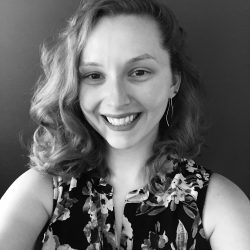
Learn more about Love Data Week at ICPSR. #LoveData24
Falvey loves data, all kinds of data, and we want to celebrate Love Data Week by talking about the different ways data is used on campus. At Villanova University we have many disciplines across campus, and each of them use data in their own way. Now how each discipline uses data might not always be as obvious, such as in the social sciences and humanities, compared to the STEM fields, and that is why we want to illustrate some of the ways data has been used across the disciplines that aren’t quite as obvious. In the world of librarianship, data plays a role in many of our decisions. In thinking about how we decide whether a program was successful or whether we are going to renew a resource for another year we rely on data to inform our decisions. Each year we evaluate the resource subscriptions we are going to keep, and we do this by examining the usage data collected.
Sarah Wingo, Librarian for English Literature, Theatre, and Romance Languages and Literature, offered the following demonstration of how data can be used to explore literature.
“Often when we think of data we think of massive data sets too big for a human to ever hope to analyze, but using data to better understand literary texts is not new to scholars of English literature nor does it always have to be at such an enormous scale. One of the more famous examples of using data to better understand a literary text has to do with Shakespeare’s First Folio. In 1920 Thomas Satchell noticed a distinct difference in spellings of 35 words in the first half of McBeth to the second half. Other scholars such as Edwin Eliott Willoughby in 1932, and Alice Walker in 1954 would further contribute to this idea by expanding the investigation to the rest of the First Folio and positing that there were multiple compositors who worked on type setting the First Folio. These early researchers were attempting to use meticulous textual analysis to do what we often use computers to do today, which is gather textual data to provide us with new information about a text, in this case how many different compositors may have worked on the typesetting for the first folio. Helping scholars to not only better understand how printing houses worked in the 1620s, but also helping scholars to better understand the text we are left with.”
For more on this ongoing debate over the First Folio: https://www.gabrielegan.com/publications/Egan2012d.htm
Further Reading:
Eve, Martin Paul. The Digital Humanities and Literary Studies. First edition. Oxford University Press, 2022. https://library.villanova.edu/Find/Record/2835904?sid=146389460
Underwood, Ted. Distant Horizons: Digital Evidence and Literary Change. The University of Chicago Press, 2019. https://library.villanova.edu/Find/Record/1954455?sid=146390124
Sarah’s example of how researchers have been able to analyze the spelling of texts to explore authorship of classic pieces, is just one way that researchers create and use data. In the field of Communication and Literature, research data can be created by counting the frequency of certain terms, or even by examining the tone used in a work. Research on tone can look at the proportion of positive or negative words used in a piece. An interesting topic of study that has crossed disciplines, is the examination of the media’s portrayal of mental health. This is a topic that has been explored by Sociologists, Psychologists, and the Communication field. Each of these disciplines have explored how news articles have dealt with mental health, though the questions they have looked to answer might vary due to their focus. The research question often shapes the type of data being created and used, with one focus of this topic having been to answer whether there has been a change in perception of mental health in the news over time. Compiling a collection of hundreds and even thousands of news articles, a text analysis is able to show the overall tone of articles depicting mental health and whether there has been a shift in tone between the years. Interested in your own text analysis? Check out Gale’s Digital Scholar Lab in our Databases A to Z list, where you can explore the Gale collection and conduct text analyses.
Further Reading:
Chen, M., and S. Lawrie. “Newspaper Depictions of Mental and Physical Health.” BJPsych Bulletin, vol. 41, no. 6, , p. 308, https://doi.org/10.1192/pb.bp.116.054775. https://library.villanova.edu/Find/EdsRecord/edselc,edselc.2-52.0-85036633598
R, Whitley, and Wang J. “Good News? A Longitudinal Analysis of Newspaper Portrayals of Mental Illness in Canada 2005 to 2015.” Canadian Journal of Psychiatry. Revue Canadienne De Psychiatrie, vol. 62, no. 4, 2017, pp. 278-285, https://doi.org/10.1177/0706743716675856. https://library.villanova.edu/Find/EdsRecord/cmedm,27777273
Please join us in celebrating another year of data appreciation, where you can learn about some of the wonderful resources available to Villanova affiliates through Falvey Library and how students on campus are working with data. Check out our Love Data Week 2024 events page and register for one, or all, of our events!
For more information about different data resources Falvey offers check out the Falvey library blog. There will be different data related posts throughout the week! Follow and spread the word about Love Data Week 2024: @lovedataweek on X and Instagram #lovedata24
Make sure to join us again next year for Love Data Week 2025, which will run from Feb. 10-14.
 Nicole Daly is Communication Librarian at Falvey Memorial Library.
Nicole Daly is Communication Librarian at Falvey Memorial Library.


















 Nicole Daly is Communication Librarian at Falvey Memorial Library.
Nicole Daly is Communication Librarian at Falvey Memorial Library.